 British Envoys to Germany and British Envoys to the Kaiserreich
British Envoys to Germany and British Envoys to the Kaiserreich
Source Edition
The editorial series consists of official dispatches written for the Foreign Office by British envoys to the German States in the 19th century, covering the period from the Vienna Congress in 1815 to the dissolution of the German Confederation (Deutscher Bund) in 1866, the North German Confederation from 1867 to 1870, and from the foundation of the German Kaiserreich in 1871 to 1897. All dispatches have been transcribed and annotated for the first time. The selection presents the main attitudes to the political, economic, military, cultural, and social situation in the German States as described and assessed by British diplomats. The volumes are published in the Fifth Camden Series for the Royal Historical Society in association with the German Historical Institute London.
Editorial Principles

The series British Envoys to Germany comprises a selection of official reports sent by British diplomats from the British diplomatic missions in the German Confederation and the German Kaiserreich (Berlin, Darmstadt, Dresden, Frankfurt, Munich, Hamburg, Hanover, Stuttgart, and Vienna) to the Foreign Office between 1816 and 1897. All originals are held in the National Archives/Public Record Office, Kew.
The selection is based on the quality, originality of perspective, and informative value of the dispatches as well as on a balance between the individual missions. Although the series does not aim to present a representative selection of letters from each mission, it is intended to cover the major developments of the period 1816 to 1866 and to present as multifaceted a picture of British perceptions of Germany as possible. Dispatches on non-German affairs (including the non-German parts of the Austrian Empire) which do not refer to Anglo-German relations were not considered for selection.
Each dispatch is provided with a standardized heading giving the archive class mark (e.g. FO 68/72 = Foreign Office, general correspondence Saxony, volume 72), author, addressee, number of the dispatch, place and date of origin, and (from British Envoys to the Kaiserreich, Vol. I ) in squared brackets, further information which has been taken from the dockets (found on the reverse of the letters). This usually comprises the date the dispatch was received at the Foreign Office, the name of the messenger, the distribution list (government departments, individuals, other legations), recipients’ initials, initials of Foreign Office clerks, the permanent under-secretary, and, lastly, the initial of the incumbent secretary of state. Where possible, in-house acronyms have also been retained including ‘Qy’, meaning ‘Query’, refering to relevant department, minister, or other authority; ‘X’, which, in the Western Department of the Foreign Office, had multiple meanings including (specifically for the dockets) ‘put by’; and ‘FS’ which stood for ‘under flying seal’, indicating that diplomats were authorized to open dispatches sent via their legation before forwarding them to their final destination.
Each dispatch is preceded by a brief summary in italics composed on the basis of the original dockets. The transcribed reports are printed in their entirety in order to maintain the authenticity of the sources, although the standardized salutation and concluding formula are omitted. Enclosures to the original dispatches, which can be voluminous, are not reproduced, but listed in footnotes. With the exception of ‘ß’ (which has been transcribed as ‘ss’), the orthography (including capitalization and abbreviations), punctuation (including dashes, hyphens, apostrophes, mixed use of single and double quotation marks and the usage of ‘it's’ as a possessive pronoun instead of ‘its’), emphases (underlining), and superscript of the original are retained. Errors or deviations in the original which might be mistaken for mistranscriptions are marked ‘[sic]’. Placeholders, line breaks, and paging are not considered.
Annotations to the dispatches, in the form of brief footnotes, aim to provide all the information required to understand any obscure documents. German, French, and Latin expressions and terms are translated. Treaties, legislation, and publications mentioned in the reports are specified in the footnotes, and explained where necessary. In many cases, reference is made to other annotations and documents in the same volume. All individuals mentioned are identified where possible and listed with brief biographies in the annotated index of names. A subject index and index of places completes each volume.
A combined subject and biographical index (including the short biographies) of the series is available online. Additionally, all dispatches included in the volumes are listed and accessible via search tools.
Missions and Diplomats
A compendium of envoys and missions is available here.
Reviews
The English Historical Review
‘The high quality of the edition, including an annotated index of names and subjects, contributes to a very valuable collection of sources which will be welcomed by all historians interested in Anglo-German perceptions and in the history of diplomatic services in the nineteenth century. The edition of the following volumes is eagerly awaited.’ (Jörn Leonhard in The English Historical Review, 117/470, Feb. 2002, 208–09)
‘This volume and series will constitute a lasting and central resource for British, German and European historians, and should also be a reference work for those working in diplomatic history and international relations. The German state system, the Confederation, formed an intricate mechanism central to the European balance of power established in 1815. The Confederation reflected a view of international relations and the European political landscape which rested upon principles predating nationalism. As a result it has attracted more attention recently with the rise of multi-ethnic and regional political units and, among German historians, against the backdrop of German reunification and the reappearance of the Saxon and Prussian ghosts. With respect to such subjects, the British envoys’ dispatches will provide a wealth of insight and stimulation to reflection. The German Historical Institute and the Royal Historical Society should be praised for recapturing and making accessible a truly monumental resource.’ (John R. Davis in The English Historical Review, 123/502, June 2008, 774–5)
‘The volumes are an indispensable and monumental source for German and British historians alike, whether students, researchers or teachers. For German historians, there is comment about constitutional, legal, economic, commercial and cultural developments. Given the British slant, the dispatches also have historiographical resonance within discussion of German adherence to Anglo-American political models. The voices of German politicians and monarchs are conveyed to London, and with them the myriad of perspectives and concerns of the states within the Germanic Confederation. For the British historian, the reports shed light on the information digested by the Foreign Office, and help analysis of the decision-making process regarding Germany and Europe during the Palmerstonian years.’ (John R. Davis in The English Historical Review, 128/535, Dec. 2013, 1607–9)
‘In a sequel to the earlier Camden volumes, British Envoys to Germany, 1818–1866, this book presents a meticulously edited and selection of official reports (from the National Archives, Kew) from the British diplomatic missions in Berlin, Darmstadt, Dresden, Stuttgart and Munich, and emphasises the value (both for contemporaries and for historians) of the maintenance of a variety of different perspectives on German affairs by the British Foreign Office.’ (Notices of Records, Texts and Reference Works, The English Historical Review, 134/566, Feb. 2019, 162)
German History
‘These reports capture the nuance and ambivalence that British envoys heard every day in their conversations with impact players in the worlds of German politics. The envoys penetrated beneath the sneers and crotchets that ricocheted between Germans themselves to discern the more tangible prospects that usually lay hidden from view. As a result, and without recourse to the notion of an unbridgeable Anglo-German antagonism, which appeared much later, we can now better understand the myriad reasons, including hellish ones, for such intense British interest in Germany. Central Europe held a fascination for British envoys in the nineteenth century because it was embroiled in multi-dimensional struggles to avoid, to reverse or – in Bismarck’s case – actively to foment a ‘national’ revolution. Seen from inside, seen from afar, preunification Germany now looks quite different from how it seemed not so many years ago. English diplomats discerned little evidence that Prussia would emerge victorious from the power struggles that shook the continent. […] But this splendid edition has added one more nail to the coffin of the original Sonderweg theory. Germany was ‘special’ – indeed – but so were its constituent parts. Despite the unique ways in which the French and industrial revolutions shaped its history, Germany was not following a single path toward modernity. For uncovering new dimensions of ‘German’ history before Germany existed, and by showing why the Sonderweg concept would have seemed ridiculous to contemporary observers, the editors of British Envoys to Germany deserve our sincere gratitude.’ (James Retallack, ‘Reform or Revolution? British Envoys to Germany and the Culture of Diplomacy, 1816–1905’ [review article], German History, 31/4 (2013), 550–78, here 577–8)
Geschichte in Wissenschaft und Unterricht
'Am Ende der Lektüre beider Bände wird klar, dass die deutsch-britischen Beziehungen mit den Eintritt des Reichs in die Weltpolitik zwar in eine neue Epoche übergingen, von eine teleologischen Vorbestimmung in die Katastrophe jedoch keine Rede sein konnte.'
(Ulrich Lappenküper, 'Deutsches Kaiserreich 1871–1918. Teil II' [review article], Geschichte in Wissenschaft und Unterricht, 73 7/8 (2022), 452-477, here 453)
History
‘The series [...] will be a highly useful reference point for teachers and researchers of Anglo-German relations, and nineteenth-century British, German and diplomatic history.’ (John R. Davis in History, 87 (2002), p. 624)
Albion: A Quarterly Journal Concerned with British Studies
‘The documents selected for this volume make for fascinating reading. Even when the envoys turn to such matters as the postal system, trade fairs, and accounts of royal marriages and deaths, they are engaging. When they deal with the pressing issues of the day such as constitutionalism, revolution, freedom of the press, religious toleration, to name just a few, they are truly provoking. […] The dispatches vary in their tone and content depending on place and as such they reveal a remarkably diverse Germany. […] That said, this is a superb volume; intelligently and carefully put together, it is a must read for all historians of nineteenth-century Europe.’ (John K. Severn in Albion: A Quarterly Journal Concerned with British Studies, 35/2 (2003), 323–24)
European History Quarterly
‘… it enables the reader to picture more clearly how developments in the German states appeared to, and were followed by, the envoys extraordinary and through them, the makers of British foreign policy in London. As a consequence this collection provides the modern-day historian with a rare set of published contemporary English-language commentaries, covering events in Germany in the immediate period after the Congress of Vienna. […] It is this more factual, official view of pre-Unification Germany, as seen through various British eyes, which is presented here. This volume serves as a substantial appetizer for the forthcoming second instalment covering the longer period of 1829–1866 [in three volumes], during which the Industrial Revolution really began to take off in Germany, and the different German states began to move more quickly towards their unification. For this reason alone, the second volume will be eagerly awaited by those who value the contribution made here by the first, giving us an insight into the early development of a nation which would go on to play such an important part in the history of the twentieth century.’ (Owain James Wright in European History Quarterly, 33/2 (2003), 269–72)
‘In identifying and making accessible this material the series serves a very valuable function in helping to refine understandings of Anglo-German relations during a crucial period. […] The letters are usefully, accurately, and clearly annotated and indexed (and this may be supplemented by reference to the excellent on-line combined index for all four volumes). As such, this edition is an invaluable resource for studies of British perceptions of German affairs and will satisfy the needs and interests of most students of the subject. It is good news, therefore, that the project is now to be extended, and we can look forward to similar volumes focused on the reports of British Envoys to the Kaiserreich.’ (David Brown in European History Quarterly, 43/2 (2013), 382–84.)
Historical Journal
‘It must surely be a costly enterprise, but will eventually become the kind of reference book generations of historians have to take into account if they want to understand the processes which led from the German Federation to the German Empire. To see these events through British spectacles gives one a fresh angle on inner German developments and it also reveals a lot about the British approach to other countries. The decision the editors have to make in selecting the most interesting out of a vast quantity of sources is of course always a difficult one. That today's scholars are not simply interested in political dispatches but, for example, want to know more about the crime statistics of German cities, has been taken into account. The result is a well balanced selection that will probably please political, social, economic and military historians as well.’ (Karina Urbach in Historical Journal, 46/4 (2003))
‘The editors have done a marvellous job in selecting from the voluminous and wordy contributions as well as in introducing the sources to the reader, and in providing reports from Frankfurt, Prussia, the Hanse towns, Hanover, Saxony, Württemberg, Bavaria, and Austria. […]The benefit of the edition of British envoy reports to the German lands lies in providing considerable and subtle evidence of the diplomatic elite’s views of liberalism and democracy, constitutional reform, and the nation state in Germany. The envoys’ reports provide substantial evidence that British Victorian elites were far less open to continental liberal-democratic reforms than a German Sonderweg view might still suggest. In this respect, the view from abroad might serve to widen horizons and interpretations of the historical place of the connections and images evoked by the revolutions of 1848 as a European phenomenon.’ (Christian Müller in Historical Journal, 53/1 (2010), 241–2)
H-German
‘The colloborative enterprise of London's German Historical Institute and the Royal Historical Society to publish hundreds of envoys' reports from Germany in the period 1830–47 constitutes a significant contribution to the era's research apparatus. Editors Markus Moesslang, Sabine Freitag, and Peter Wende have done a superb job editing and annotating the volume. The introduction offers a cogent analysis of the principal themes; the subject index is thorough and thematically subdivided; and the annotated index of names is a trove of biographical information on both the famous and obscure in the Vormärz period. We have here a first-rate research tool. No mention is made of a third volume for the Revolution of 1848/49, which might have been the logical conclusion to this volume, and the remaining decades of the Confederation, but one hopes that this important third volume is in the making. [...] In conclusion, this volume and its companions are highly recommended for undergraduate and graduate seminar work. It deserves to be a standard work in every reference library.’ (James M. Brophy, Review for H-German, 24 February 2004)
The International History Review XXVI
‘But the reports in this volume are full of interest. They represent the thoughts of generally well-informed British diplomats, often with a deeper understanding of what was happening than many Germans possessed. Beyond immediate crises, accounts of the cholera and of arrangements for poor relief, the reports provided perceptive insights into the likely future of Germany. In the light of the momentous changes of the next generation and the move to unification under Prussian auspices, what was written in the 1830s and 1840s takes on a special significance and value.’ (John Clarke on volume II in The International History Review, 26/1 (Mar. 2004), 143–5)
sehepunkte
‘Insgesamt handelt es sich um eine wertvolle Quellensammlung sowohl für die Heranführung von insbesondere britischen und amerikanischen Studierenden an die Arbeit mit Quellen zur deutschen Geschichte als auch für die Forschung. Die Vielfalt der deutschen Staatenlandschaft und die Mühen der Staaten des Bundes, in praktischen, etwa handelspolitischen Fragen, Interessenkonflikte zu überwinden und gemeinsam das Gesamtinteresse zu definieren, erhalten durch den Filter zeitgenössischer britischer Berichte eine interessante Nuance und im Hinblick auf die Schwierigkeiten, auf europäischer Ebene gemeinsame Nenner zu finden, auch eine vielschichtige historische Relevanz.’ (Matthias Schulz in sehepunkte 4/6 (2004))
‘Der so vermittelte britische Blick auf den Deutschen Bund ist daher nicht nur von politikgeschichtlicher Relevanz, sondern ist auch für diejenigen Leser lohnend, die sich für Kulturtransfer, für Ideengeschichte oder für das Leben und Wirken von Diplomaten im neunzehnten Jahrhundert interessieren. Die vielseitige Benutzbarkeit des vorliegenden Bandes ist neben den aufschlussreichen Quellen vor allem der hervorragenden Editionsqualität geschuldet. Die Herausgeber haben aus der Unmenge von Berichten eine überzeugende Auswahl getroffen und die einzelnen Quellenstücke hilfreich kommentiert. Ein ausführliches Personenregister und ein Sachregister ermöglichen einen bequemen Zugriff auf Einzelaspekte der vorgelegten Texte. [...] Wer sich fortan mit der internationalen Geschichte Europas in der Revolutionsepoche, mit der britischen Europapolitik im neunzehnten Jahrhundert oder mit der außenpolitischen Dimension der deutschen Nationalstaatsgründung beschäftigen will, wird dieses Quellenwerk unentbehrlich finden.’ (Frank Lorenz Müller in sehepunkte 7/9 (2007))
Historische Zeitschrift
‘Dieser Blick auf Deutschland aus britischer Perspektive bietet einen beeindruckenden Spiegel der Ereignisse und zeigt Aspekte, die in “innerdeutschen” Quellen üblicherweise fehlen. Somit liefert er nicht nur weitreichende Erkenntnisse über die Sichtweise (und großenteils auch die Mentalität) britischer Diplomaten, sondern in vielen Facetten auch Neues zu den Ereignissen und Vorgängen selbst. Dafür und für die Sorgfalt in der Auswahl und Präsentation ist den Editoren zu danken.’ (Wolfgang Elz in Historische Zeitschrift, 288 (2009), 471–4)
‘Inhaltlich lassen sich die Berichte nicht leicht zusammenfassen, weil zu viele verschiedene Materien angesprochen werden; das geht hin bis zu fast Skurrilem, etwa wenn der Berliner Legationssekretär Walsham anbietet, Erbswurst nach London zu senden, damit man im Kriegsministerium prüfen könne, was den preußischen Soldaten als “Eiserne Ration” mitgegeben werde (S. 176f.). Neben den genannten etlichen Berichten zu außenpolitischen Entwicklungen bilden aber die Prozesse der staatlichen Vereinheitlichung nach 1871 auf den verschiedensten Ebenen und deren Aufnahme in Deutschland nach 1871, die gegenläufigen Vorgänge im Rahmen des Kulturkampfs und später des Sozialistengesetzes, die in den kleineren Ländern des Reiches sehr unterschiedlich aufgenommen und von den betreffenden Diplomaten auch ganz unterschiedlich eingeschätzt wurden [...] Insofern bieten die Berichte der britischen Beobachter aufschlussreiches Material, weil sie mit der Außenperspektive auf die Vorgänge in Deutschland häufig resümierend, wenn auch keinesfalls einheitlich die entsprechenden Vorgänge und Abläufe schildern. [...] Editorisch halten die Herausgeber die hohen Standards, die die Vorgängerreihe gesetzt hat. Es wäre nicht nur deswegen höchst wünschenswert, wenn das DHI nach dem Erscheinen des zweiten Bandes dieser Reihe künftig auch noch die Lücke für die Jahre 1866–1870 schließen würde, weil dann eine geschlossene Überlieferung für die Jahrzehnte zwischen dem Wiener Kongress und dem Ende des 19.Jahrhundertsvorliegen würde.’ (Wolfgang Elz in Historische Zeitschrift, 306 (2018), 242–4)
‘Vor allem die Berichte aus Berlin, aber auch so manche aus den anderen Vertretungen geben einen guten Einblick in die Volatilität der deutsch-britischen, aber auch allgemeiner der europäischen Großmächtebeziehungen, die häufig im Mittelpunkt der Berichterstattung stehen. Dabei brachte der Beginn der deutschen Kolonialpolitik 1884 einen tiefen Einschnitt, denn ab diesem Zeitpunkt empfanden die britischen Vertreter, auch im Hinblick auf die häufig antibritische Stimmung der öffentlichen Meinung, Deutschland als ernsthaften Konkurrenten. Überhaupt bilden hier Berichte zu den nun vermehrt krisenhaften internationalen Beziehungen, der Möglichkeit eines deutsch-französischen oder deutsch-russischen Krieges oder aber eines deutschen Zusammengehens mit Frankreich und im Zusammenhang damit zur Frage nach der Haltung Englands im nicht mehr gut funktionierenden Konzert der Mächte die Schwerpunkte. Bei aller indirekten Anerkennung des deutschen Machtzuwachses, der darin auch zum Ausdruck kommt, zeigt sich bei einigen Berichterstattern, insbesondere bei Strachey, dem Ministerresidenten in Dresden, doch ein starker Dünkel im Hinblick auf die politische Informiertheit der Deutschen und die Fähigkeiten ihrer Politiker: Im Vergleich mit England seien die Bevölkerung und die deutsche Presse “sklavisch”, die Elogen auf den Kaiser “byzantinisch”, und überhaupt sei Deutschland “a country of low political enlightenment” (S. 350): “the Germans are in the political nursery” (S. 356).’ (Wolfgang Elz in Historische Zeitschrift, 310 (2020), 763–4)
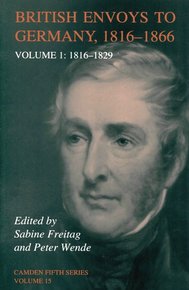
Sabine Freitag and Peter Wende (eds.)
British Envoys to Germany, 1816–1866, Volume I: 1816–1829
Camden Fifth Series, 15
Cambridge: Cambridge University Press for the Royal Historical Society in association with the German Historical Institute London. 2000.
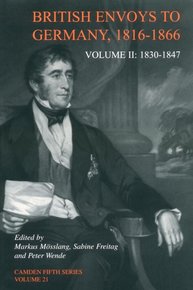
Markus Mösslang, Sabine Freitag, and Peter Wende (eds.)
British Envoys to Germany, 1816–1866, Volume II: 1830–1847
Camden Fifth Series, 21
Cambridge: Cambridge University Press for the Royal Historical Society in association with the German Historical Institute London. 2002.
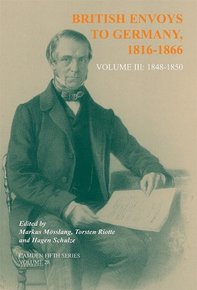
Markus Mösslang, Torsten Riotte, and Hagen Schulze (eds.)
British Envoys to Germany, 1816–1866, Volume III: 1848–1850
Camden Fifth Series, 28
Cambridge: Cambridge University Press for the Royal Historical Society in association with the German Historical Institute London. 2006.
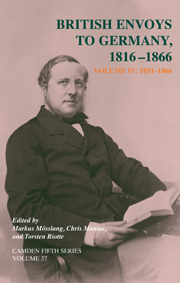
Markus Mösslang, Chris Manias, and Torsten Riotte (eds.)
British Envoys to Germany, 1816–1866, Volume IV: 1851–1866
Camden Fifth Series, 37
Cambridge: Cambridge University Press for the Royal Historical Society in association with the German Historical Institute London. 2010.
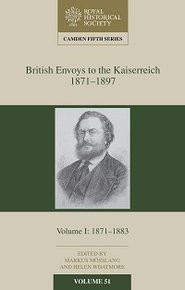
Markus Mösslang and Helen Whatmore (eds.)
British Envoys to the Kaiserreich, 1871–1897, Volume I: 1871–1883
Camden Fifth Series, 51
Cambridge: Cambridge University Press for the Royal Historical Society in association with the German Historical Institute London. 2016
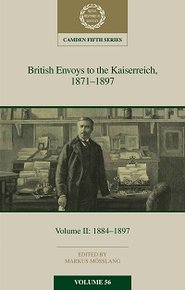
Markus Mösslang (ed.)
British Envoys to the Kaiserreich, 1871–1897, Volume II: 1884–1897
Camden Fifth Series, 56
Cambridge: Cambridge University Press for the Royal Historical Society in association with the German Historical Institute London. 2019
Supplement Volume
Markus Mösslang
British Envoys to Germany, 1867 to 1870
Supplement Volume
Forthcoming 2026
Related Publications
Markus Mösslang, ‘Der britische Blick auf Deutschland – Gesandtenberichte der Jahre 1816 bis 1897’, Max Weber Stiftung, Themenportal, 2024 [link].
Markus Mösslang, ‘“The scene on that Mountain”: Britische Pressereaktionen und diplomatische Beobachtungen zum Wartburgfest’, in J.Bauer, S. Gerber, and C. Spehr (eds.), Das Wartburgfest von 1817 als europäisches Ereignis, Quellen und Beiträge zur Geschichte der Universität Jena 15 (Stuttgart: Franz Steiner Verlag, 2020), 85–103.
Markus Mösslang, ‘“Side by Side with Sound Commercial Principles”: Deutscher Zollverein und deutsche Nation in der Wahrnehmung britischer Diplomaten’, in H. W. Hahn, M. Kreutzmann (eds.), Der deutsche Zollverein: Ökonomie und Nation im 19. Jahrhundert (Köln u.a.: Böhlau 2012), 229–254.
Markus Mösslang, ‘Gestaltungsraum und lokale Lebenswelt: Britische Diplomaten an ihren deutschen Standorten, 1815–1914’, in Hillard von Thiessen and Christian Windler (eds.), Akteure der Außenbeziehungen: Netzwerke und Interkulturalität im historischen Wandel, Externa. Geschichte der Außenbeziehungen in neuen Perspektiven 1 (Köln u.a.: Böhlau 2010), 199–215.
Markus Mösslang and Torsten Riotte, The Diplomats’ World: A Cultural History of Diplomacy, 1815–1914 (Oxford: Oxford University Press, 2008).
Markus Mösslang, ‘Britische Gesandtschaftsberichte aus den Staaten des Deutschen Bundes (1816-1866)’, in Jahrbuch der historischen Forschung in der Bundesrepublik Deutschland, Berichtsjahr 2002 (Munich: Oldenbourg 2003), 28–33.
Sabine Freitag,‘“The narrow limits of this Kingdom”: Sachsen im Spiegel britischer Gesandtschaftsberichte aus dem Vormärz’, in Dresdner Hefte. Beiträge zur Kulturgeschichte, 20 Heft 2–3 (2002), 27–37.